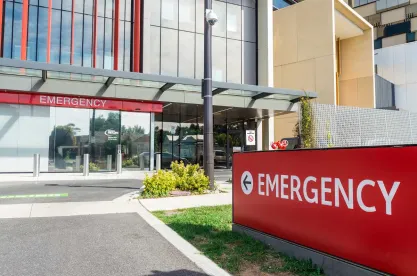On March 24, 2023, the Illinois House of Representatives passed legislation (HB 2222) that, if passed by the Illinois Senate and signed by Governor J.B. Pritzker, would increase oversight of certain “covered transactions” for healthcare facilities and provider organizations, effective January 1, 2024. Unlike the federal Hart-Scott-Rodino (HSR) Act, which requires notice to the federal antitrust agencies for transactions valued over a certain dollar amount threshold, HB 2222 has no minimum transaction value threshold for intrastate covered transactions and would require reporting even for small transactions that are unlikely to raise antitrust concerns. The Illinois Attorney General’s Office (IL AG) asserts that the legislative intent is to establish a review process to assess a transaction’s impact on cost, quality and access to care.
IN DEPTH
Proposed Legislation
The two chambers of the Illinois legislature proposed separate bills in 2023 to establish a review process for the IL AG to assess a transaction’s impact on cost, quality and access to care: SB 1766 and HB 2222. HB 2222 has had more traction and, as of the date of this On the Subject, was presented before the Senate’s Assignments Committee. Accordingly, this On the Subject focuses on HB 2222.
HB 2222 would provide the IL AG with additional tools to exercise oversight over a broad array of transactions that involve healthcare facilities through amendments to the Illinois Antitrust Act, the State Finance Act and the Illinois Health Facilities Planning Act.
Illinois Antitrust Act Amendments
HB 2222 would amend the Illinois Antitrust Act to add the new transaction reporting requirement. The Illinois Antitrust Act prohibits certain restraints of trade and monopolistic practices. In addition to a private right of action, the IL AG has the authority to pursue criminal and civil violations of the Illinois Antitrust Act.
HB 2222 would require 30 days’ prior notice to the IL AG of any merger, acquisition or contracting affiliation between two or more healthcare facilities or provider organizations not previously under common ownership or contracting affiliation (covered transactions). Covered transactions would also include those between an Illinois healthcare entity and an out-of-state healthcare entity when the out-of-state entity generates $10 million or more in annual revenue from patients residing in Illinois.
HB 2222 defines “healthcare facilities” broadly to include entities such as the following:
- Ambulatory surgery treatment centers
- Hospitals and other locations or operations licensed under the Hospital Licensing Act
- Outpatient surgery centers
- Kidney disease treatment centers
- Any other institution, place, building or room used for provision of healthcare category or services defined under the Illinois Health Facilities Planning Act, including cardiac catheterization and open-heart surgery.
HB 2222’s “provider organizations” definition is also broad and includes any corporation, partnership, business trust, association or organized group of persons whether incorporated or not, in the business of healthcare delivery or management, that represents 20 or more healthcare providers in contracting with health carriers or third-party administrators for the payment of healthcare services. This would include physician organizations, physician hospital organizations, independent practice associations, provider networks and accountable care organizations, and would exclude facilities operating as part of a physician practice or groups of other licensed healthcare professionals, or where such practices are operated within a portion of a healthcare facility.
A “contracting affiliation” would mean the formation of a relationship between two or more entities that permits the entities to negotiate jointly with health carriers or third-party administrators over rates for professional medical services, or permits one entity to negotiate on behalf of the other entity with health carriers or third-party administrators over rates for professional medical services. Contracting affiliations do not include arrangements among entities under common ownership.
If HB 2222 is signed into law in its current form, any healthcare facility or provider organization that is a party to a covered transaction and files a premerger notification to the federal antitrust enforcement agencies in compliance with HSR Act must simultaneously provide a copy of such filing to the IL AG. When a transaction is not covered by the HSR Act, a healthcare facility would satisfy its notice obligations to the IL AG under HB 2222 by filing an application for a change of ownership with the Illinois Health Facilities and Services Review Board (Review Board) in compliance with the Illinois Health Facilities Planning Act. In that scenario, the healthcare facility would not need to provide separate notice to the IL AG, because the Review Board would provide a copy to the IL AG at the same time that it provided such notice to other stakeholders, as required by Section 8.5(a) of the Health Facilities Planning Act (as described in more detail below).
Any healthcare facility or provider organization that is party to a covered transaction not described above (i.e., a transaction that does not require a filing under the HSR Act or a change of ownership filing with the Review Board) would be required to provide written notice to the IL AG that includes the following:
- The names of the parties and their current business address
- Identification of all locations where healthcare services are currently provided by each party
- A brief description of the nature and purpose of the proposed transaction
- The anticipated effective date of the proposed transaction.
The IL AG may request additional information, as it determines necessary, within 30 days of receiving notice of the covered transaction. If the IL AG requests additional information, the covered transaction may not proceed until 30 days after the parties have substantially complied with the request. Any subsequent IL AG request for additional information would not result in any additional delay of the covered transaction.
Amendments to the Illinois Antitrust Act would also provide that, should the IL AG investigate any act or practices prohibited by the Antitrust Act, all documentary material, transcripts, oral testimony and answers to interrogatories obtained may be used by the IL AG in any administrative or judicial action or proceeding, and all such information, as well as information produced pursuant to the new reporting requirement, shall be treated as if produced pursuant to a subpoena for purposes of maintaining the confidentiality of such information.
Failure to comply with the IL AG notice requirements and responses to IL AG requests for additional information would expose the healthcare facility or provider organization to a penalty of $500 for each day in violation, after a 10-day cure period. The IL AG would also have the right to seek a temporary restraining order or injunctive relief to prevent the organization from continuing its noncompliance or doing “any act in furtherance thereof.”
Illinois Finance Act Amendments
HB 2222 would amend the Illinois Finance Act to establish a new antitrust enforcement fund to be used for Illinois Antitrust Act enforcement. The penalties described above would be deposited into the fund.
Health Facilities Planning Act Amendments
HB 2222 would amend Section 8.5(a) of the Health Facilities Planning Act to add a requirement for notice to the IL AG for change of ownership of a healthcare facility, aligning with the changes to the Antitrust Act. The proposed legislation would require that, upon the Review Board’s finding that an application for a change of ownership is complete, notice of the same be delivered to the IL AG in the same manner and at the same time as notice of such transactions is delivered to the state representative and state senator of the district in which the healthcare facility is located and posted to the Review Board’s website.
Comparison to SB 1766
SB 1766 is more onerous than HB 2222 in several ways:
- It would require 60 rather than 30 days’ prior notice to the IL AG of a covered transaction.
- It would require submission of all transaction agreements, including ancillary agreements, and financial/economic analyses that the party reviewed or relied on in negotiating the transaction.
- It defines a much lower number of providers that make up a “provider organization,” as compared to HB 2222.
As discussed above, however, it appears that HB 2222 is the bill on this subject that will proceed.
Precedent
HB 2222, if signed into law, would place Illinois squarely among the states that require AG review of certain healthcare transactions. Some states have longstanding AG review and approval processes, while others have adopted such requirements more recently, such as the state of Washington in January 2020 (in fact, SB 1766 and the first iteration of HB 2222 reflect requirements and thresholds similar to those enacted in Washington, such as 60-day advance notice of acquisitions, mergers and contracting affiliations involving two or more hospitals/hospital systems or provider organizations, and a seven provider threshold for defined “provider organizations”). The timing of the review process enacted in Washington, and the similarities to SB 1766 and HB 2222 as initially introduced, may not be coincidental.
Anticipated Impact if HB 2222 Is Passed in Its Current Form
The IL AG has the existing authority to investigate transactions and pursue criminal and civil violations of the Illinois Antitrust Act. Like other state AGs, the IL AG presently coordinates with the federal antitrust enforcement agencies on merger investigations, including those that are HSR reportable and those that are not. The biggest impact of HB 2222, if it passes, is that the IL AG would receive affirmative notice of covered transactions and would have the opportunity to investigate transactions that otherwise might not have come to its attention.
Potential for Transaction Delays
As proposed, this new IL AG affirmative review process appears to have the potential to delay the closing of covered transactions in Illinois for an indeterminate period of time. Based on the timeline outlined in HB 2222, if a healthcare facility or provider organization gives the IL AG the required notice of a covered transaction 30 days (or event slightly more) in advance of the covered transaction’s planned closing date, and the IL AG requests additional information near the end of the 30-day period after it receives such notice, the parties would be barred from closing the transaction until they substantially comply with the IL AG’s post-notice request and an additional 30 days have passed—thereby extending the timing of closing. HB 2222’s lack of specificity regarding how to determine whether a response to the IL AG meets “substantial compliance” poses potential risk for even more delay. If “substantial compliance” is determined solely in the discretion of the IL AG, the review process could be extended for however long it takes the IL AG to make such determination, and there appears to be no check on that power.
HB 2222 also provides the IL AG with the right to seek a temporary restraining order or injunctive relief to prevent an organization from continuing its noncompliance or doing “any act in furtherance thereof,” which, if such relief is sought in advance of closing a transaction, could delay closing until the temporary restraining order or other relief was lifted.
Scope of Potential Covered Transactions
HB 2222 does not define the scope of “healthcare providers” within the definition of a “provider organization.” If the Illinois legislation that is ultimately passed follows that of certain other states (including Washington), and the ultimate definition includes a wide range of licensed healthcare professionals, then the scope of covered transactions could be very broad. With broad definitions resulting in a broader swath of transactions requiring notices to the IL AG, there also is a risk that the IL AG could become inundated with notices to process, even if the implicated transactions cause little to no concern from a quality, access or cost perspective. Similarly, the definition of “contracting affiliations” offers a broad range of relationships and entity types and captures healthcare affiliations that may not be intended by the drafters of HB 2222.
Transaction Planning
If and when this bill becomes law, healthcare facilities and provider organizations that are concerned about potential delays or onerous requests for information should consult with their legal counsel to determine the appropriate time to file the required notice. In some circumstances, parties may wish to consider requesting a dialogue with the IL AG in advance of providing written notice, to preview the covered transaction before the mandatory preclosing notice date, in order to avoid surprises and potentially streamline review time. Currently, it is unclear whether the IL AG would accept requests for dialogue in advance of providing the written notice—a practice that is common in states with similar notice requirements. Healthcare facilities and provider organizations should also consult with their legal advisors to determine the best approach to reply to an initial request for additional information from the IL AG to increase the likelihood of achieving substantial compliance and the ability to timely close the transaction.
McDermott will be following the evolution of HB 2222 and will update this On the Subject as developments arise.







 />i
/>i

